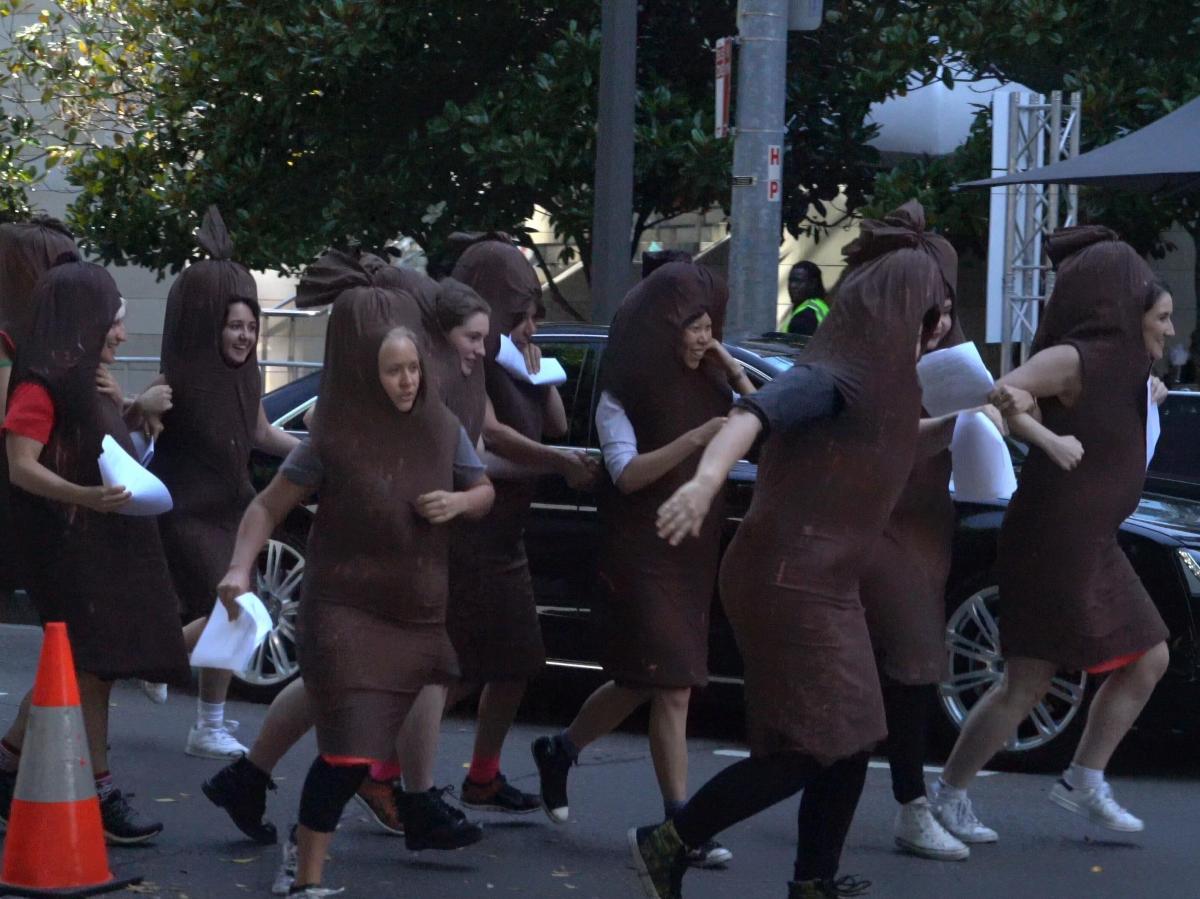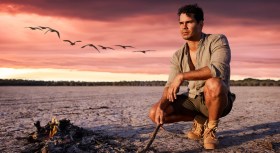Sausages creating mayhem. Image: WIFT NSW.
Mel Gibson and Hacksaw Ridge cleaned up at the AACTAs at this year with nine awards including the top gongs for Best Film and Best Director. But he may have been out-sizzled by a bunch of sausages protesting against the lack of female representation in the nominated films.
However, first let’s rewind to the “B” Awards as hosts Kitty Flanagan and Tom Gleeson gleefully dubbed them. These are the AACTA craft, childrens’, documentary, short film, short animation and subscription television awards that take place at a luncheon at the Star Casino, two days before the main event.
Despite the heat and humidity, the industry turned out in full with 700 people seated on round tables in a blessedly air-conditioned room. Kitty and Tom began by slagging off everyone, including Cate and Mel, and exhorting the guests, nominees and winners to say whatever they liked as it was only the “B” Awards and no-one else was watching or listening. Most winners ignored their hosts and were very well behaved before we swung into a musical break with a snappy group of musical theatre leading men, Swing on This.
After the main meal, things warmed up with the winners – Nial Fulton and Ivan O’Mahoney, of Best Television Documentary Program for Hitting Home, giving a rousing speech on domestic violence being a men’s issue. Less serious and more alcohol-infused was Dan Jackson’s acceptance of the award for Best Cinematography in a Documentary for In the Shadow of the Hill. Jackson dutifully followed in Kitty and Tom’s shoes by saying that all documentaries usually looked terrible before quickly exiting stage right. Then Peter Duncan, winning Best Direction in a Television Drama or Comedy for Rake, ended his acceptance speech with ‘F#%& you Donald Trump’. The last win of the day was Celia Pacquola for Best Supporting Actress in a Television Drama in A Beautiful Lie. After waiting all day and having a few drinks, Celia was refreshingly funny and frank about how desperate she was for the role.
Now back to the sausages. The purpose of the demonstration may not have been totally clear on the red carpet, however the women dressed as sausages were protesting against the lack of female representation and diversity in the AACTA nominations. At the “B” event – if we look at the Best Director awards as an example – out of the three categories of Television Series, Light Entertainment Show/Reality Series and Documentary, only Documentary had any female nominees and, as a consequence, was the only category to have a female directing winner in Anna Broinowski for Hanson: Please Explain. In the Best Short Animation Film award, there were three female director nominees with Del Kathryn Barton, along with her producers Angie Fielder and Brendan Fletcher, winning for The Nightingale and the Rose. In the Best Short Film category, there were two female director nominees with Lucy Gaffy taking out the top gong for Dream Baby with producer Kiki Dillon.
In an industry where many people work more for love than a big pay packet, taking time out to celebrate our creative talent is important. At the same time, the AACTA Awards serve to shine a harsh spotlight on the ongoing gender and diversity inequities in our industry. Has anyone mentioned quotas yet?
Onto the main event and the sausage-rolled red carpet. There were Australian stars aplenty including Rose Byrne, Isla Fisher, Mel Gibson, Paul Hogan, Geoffrey Rush and the requisite traffic jam and crowds. Jessica Mauboy kicked off proceedings with a spirited performance of Tainted Love in an unsuspecting nod to the protesting sausages. The highlights of the night included a fleeting visit from Rose Byrne and Damon Herriman before they whisked off to rejoin their thespian friends at the Sydney Theatre Company. Samuel Johnson picked up Best Actor in a Television Show for his portrayal of Molly Meldrum in Molly. With his head closely shaved, and no speech prepared, his phone charger took centre stage as it dangled from his pocket. In the tribute to Paul Hogan for the Longford Lyell Award, Delvene Delaney received a huge ovation when she arrived on stage, remembering Paul for his ‘funny bones’ and strong sense of a fair go.
There was also a lot of love in the room for Mel Gibson as Hacksaw Ridge continued its collection of awards. Celia Pacquola and Tom Gleeson delivered a strong plug for ABC TV, with Tom loudly spruiking his own show. Eva Orner won Best Feature Length Documentary with Chasing Asylum and ignored the 30 second limit to give a passionate speech about repealing the off-shore detention whistleblower legislation. She pointed out that the filmmakers and the people who spoke out in the documentary could have all been jailed – a shocking and sobering reminder amid the congratulations and celebrations.
Paul Kelly sang a moving tribute, with his daughters Madeline and Memphis, and Clive Owen for the In Memoriam segment. Later, Boy George and his iconic UK pop group, Culture Club, sang a medley of their hits that got everyone out of their seats singing and dancing.
The Byron Kennedy Award was won by unique Lynette Wallworth, a celebrated artist creating experiential and VR works that are screened internationally more frequently than in Australia.
Isla Fisher was one of the last winners as she accepted her Trailblazer Award and, introduced by Geoffrey Rush, she was a glorious ‘firecracker’. Funny and self-deprecating, she quoted Michelle Obama, plagiarized Melania Trump and thanked the Donald for blazing the path for orange people with no credentials to win.
Then everyone streamed out onto the terrace for oysters and lots of champagne.
And quotas still didn’t get a mention. In the post-AACTA media, Sophie Mathisen of Women in Film and Television claimed responsibility for the protest and is calling on AACTA for a more transparent selection process in 2017. Of the 28 narrative feature films pre-selected this year, two were directed by woman (8%) and three had female protagonists (12.5%). WIFT has drafted a AACTA Charter for Gender Equity and are waiting for a response from AACTA. Quotas have been shown to work and effect change quickly with Screen NSW well on track to achieve gender parity by 2020 and their requirement that all television drama series have women in key creative roles in order to receive development or production funding already reached. The Australian Directors Guild is also pushing for a gender parity quota.
There are many different agencies and production companies now committed to gender parity and we look forward to seeing a sausage-free red carpet next year at the AACTAs.





